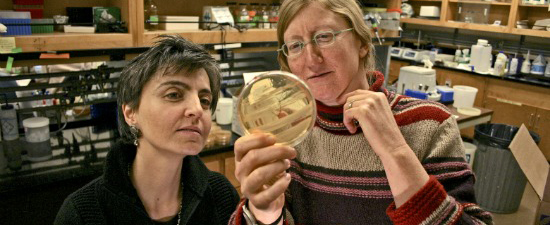Microbiology and Environmental Toxicology
Researchers in the Department of Microbiology and Environmental Toxicology seek to understand how harmful agents—including pathogens and chemicals—interact with the environment and damage humans and animals. The department and this cluster group have two main research foci: microbiology and environmental health and toxicology. These studies are by nature multidisciplinary and faculty in this department are passionate contributors to multidisciplinary efforts that cross departmental boundaries. They often collaborate in research and educational programs with colleagues in the Departments of Chemistry and Biochemistry, Biomolecular Engineering, Earth and Planetary Sciences, Molecular, Cell and Developmental Biology, Ocean Sciences, and the Institute for Marine Sciences.
Research in the area of environmental health and toxicology focuses on the exposure of organisms to toxic agents, as well as examination of the molecular and physiological processes that are impacted by these exposures—with a special emphasis exposure to metals. Faculty members address a range of questions, including environmental concentration, speciation, and isotopic composition of toxic agents, exposure pathways, and toxic consequences for key molecular and cellular mechanisms.
Research in the area of microbiology focuses on the analysis of molecular genetics of both pathogenic and non-pathogenic bacteria. Faculty address a diverse range of questions focused on how bacteria can transform metals to enhance or diminish their toxicity, and how bacteria themselves act as harmful agents by infecting humans.
Faculty (Professors and Adjuncts) and Professional Researchers affiliated with the Microbiology and Environmental Toxicology Cluster Group:
Karen Ottemann, Professor of Microbiology & Environmental Toxicology: Environmental responses of pathogenic bacteria, with a specific emphasis on Heliobacter pylori pathogenesis.
Chad Saltikov, Professor of Microbiology & Environmental Toxicology: Microbial anaerobic respiratory processes that influence the biotransformation of pollutants in the environment.
Marilou Sison-Mangus, Assistant Professor of Ocean Sciences: Microbial ecology, Evolutionary biology, Biological Oceanography.
Donald Smith, Professor of Microbiology & Environmental Toxicology: Neurotoxicity, cellular and organismal responses to environmental toxins.
Fitnat Yildiz, Professor of Microbiology & Environmental Toxicology: Understanding Processes Controlling Transmission of Bacterial Pathogens.
Jonathan Zehr, Professor of Ocean Sciences: Aquatic microbial ecology; biological oceanography.

